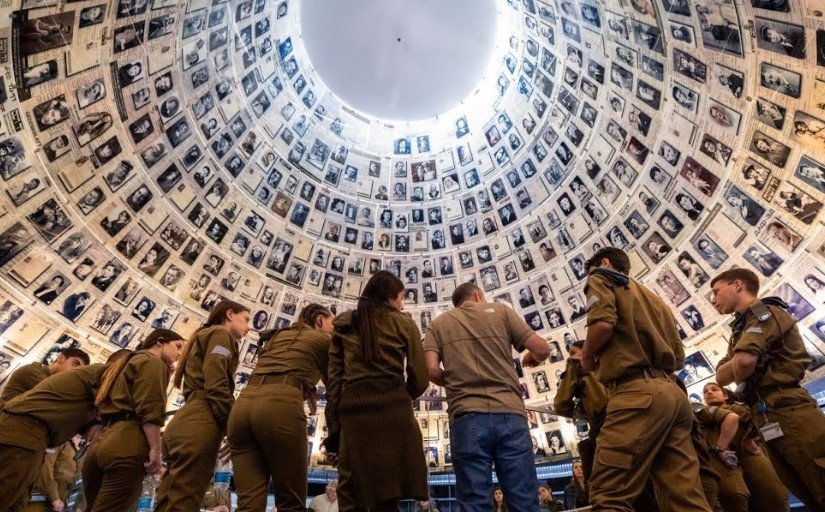Holocaust Remembrance Day in Israel this year will unfold not only through sirens and ceremonies, but also on screens across the country. A powerful lineup of new releases and old cinematic treasures will be shown to honor the memories of those who perished—and the scars left behind.
From raw archival footage to haunting animations and first-person testimonies, the variety of films brings a layered, emotional approach to recounting the Shoah. Some shake you. Some haunt you. Others simply sit with you, quietly devastating. And together, they keep memories alive.
A Nation Reflects Through the Lens of Film
Cinematheques in Jerusalem, Tel Aviv, and Ra’anana, along with cultural centers like the Israel Museum and Lev Cinema, are curating special screenings this week. The programs are anything but uniform.
You’ll find everything from traditional documentaries to modern dramas. Some films were made decades ago; others premiered just months back. This diversity in form and perspective reflects something critical: memory isn’t static, and neither is the way we carry it.
There’s Yoav Potash’s Among Neighbors, a chilling, modern-day mirror into a small Polish town with a haunting past. And Irena’s Vow, a heart-thumping dramatization of a Polish Catholic woman who risked everything to hide Jews from the Nazis. These films aren’t just stories—they’re emotional experiences.

Among Neighbors: A Microcosm of Polish-Jewish History
This new documentary by Yoav Potash cuts deep. It zeroes in on Gniewoszów, a tiny town in Poland where Jews once made up a significant part of the population. Then the Holocaust came. And then silence.
Potash, also known for his work Crime After Crime, uses present-day interviews and subtle animations to build a chilling bridge between past and present.
In this film:
-
Elderly residents remember—or avoid remembering—the town’s Jewish past.
-
Jewish survivors and their families recount horrors and miracles.
-
A young Polish photographer documents desecrated Jewish tombstones repurposed for grinding or paving.
There’s one sequence that lingers: a cracked headstone, flipped face down, used to honor a Christian dead. The Hebrew letters are still there—hidden, but unforgotten.
The film doesn’t shy away from Poland’s recent attempts to criminalize references to local collaboration with the Nazis. It’s not comfortable. It’s not meant to be.
More Than One Kind of Survivor
Not all the films focus on death camps and ghettos. Some go inward, exploring the echo of trauma across generations.
Take Traces, Voices of the Second Generation by Isaac Brown. It centers on children of survivors. Their pain isn’t always visible, but it’s real—and heavy. Their parents survived. But survival, as the film makes clear, came with a price.
At the Tel Aviv and Jerusalem cinematheques, this quiet documentary will be shown alongside louder, more direct stories. The pairing works. Trauma doesn’t wear a single face.
Then there’s The Property, a feature based on a graphic novel by Rutu Modan and adapted by her sister, Dana. It follows a family’s return to Europe to reclaim stolen land. The twist? What they uncover about themselves hits harder than any document or deed.
An Unlikely Love Story in Wartime Greece
Sleeping with the SS sounds like a thriller, but it’s actually a surreal, true story. Directed by Rami Kimchi, this film tells the tale of a Jewish boy from Salonika who hides with a Jewish family posing as shepherds.
And then—Nazis move in. Into their home. With them.
The absurdity of the situation creates a tense, almost theatrical atmosphere. But it’s all real. The boy lived with fear around every corner, unsure whether he’d be found out over dinner.
It’s a stranger-than-fiction tale, and Kimchi leans into the discomfort, letting scenes breathe, linger, and sometimes ache.
Israeli Films Grapple With the Legacy
The Tel Aviv Cinematheque is also spotlighting Israeli-made feature films that take a more modern look at Holocaust repercussions. These stories often shift the setting to Israel itself, but the shadows of Europe remain long.
Adir Miller’s The Ring follows a man trying to reclaim his family’s old possessions—only to end up questioning everything he thought he knew. Dana Modan’s The Property does something similar but with more wit, less closure.
Then there’s Soda by Erez Tadmor. A glamorous, mysterious survivor played by Rotem Sela moves into a 1950s Israeli neighborhood. Lior Raz (from Fauda) plays a former resistance fighter who falls for her. But things aren’t as simple as they seem.
Unfinished Works, Unspoken Words
One film stands out for never really being finished: From Darkness to Light, a documentary about Jerry Lewis’s infamous Holocaust project The Day the Clown Cried.
Eric Friedler and Michael Lurie’s new doc peels back the mythos surrounding Lewis’s shelved movie, in which he played a clown who led children to the gas chambers. It was controversial. Risky. Ultimately, it was never released. But its ghost still lingers.
Hannah Arendt, a biopic starring Barbara Sukowa, is also in the lineup. Her coverage of the Eichmann trial brought the phrase “the banality of evil” into our vocabulary—and into our moral framework.
A Real Pain, Streaming Now
Jesse Eisenberg’s A Real Pain might be streaming, but it deserves a mention among the cinema screenings. Co-starring Kieran Culkin in an Oscar-winning role, this film balances humor and grief as two cousins travel to Poland to trace their roots.
